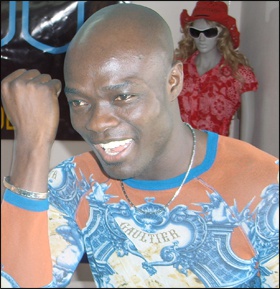John Avoka, the security man at the house of Ibrahim Sima, model and former Chief Executive Officer (CEO) of Exopa Modelling Agency, at the time of Sima’s arrest, yesterday testified that he was slapped by one of the security officers who brought his boss home.
He told the Accra Fast Track High Court, where Sima is on trial for attempting to export cocaine in two tubers of yam to Germany that when the security officers arrived at the house, he was slapped by one of them without any provocation but added he could not identify who exactly it was.
The witness said this in a court presided over by Justice Charles Quist when he was giving his evidence in chief led by James Agalga, counsel for Sima.
John stated that his boss was brought by the officers to the house in handcuffs, with his hands behind his back, on September 7 2009, noting that they banged the gate very hard while he was fast asleep at night.
According to him, when he opened the main gate, he was given a slap by one of the many officers present, explaining that the atmosphere was very intimidating.
Mr. Avoka stated that the officers afterwards entered to the room with Sima while he stood outside.
Under cross-examination by the prosecuting attorney, George Kwadwo Ofori, the accused person admitted that his boss was good to him and stated that he worked with Sima for three years.
Earlier, Prof Henry Augustine Brown Acquaye, the retired lecturer and researcher into narcotic substances who testified for Sima that the procedure used in testing the cocaine was “unprofessional and unscientific”, was cross-examined by Mr. Ofori.
Mr. Agalga objected when the state attorney asked the witness if the findings of the Ghana Standards Board (GSB) on the result of the cocaine would have been different if his recommended procedure was followed.
Counsel for Sima prayed the court to disallow the question because the burden of proof lies with the prosecution but not the witness, and the Judge upheld the objection.
When Mr. Ofori asked the witness if he was aware that the body set up by the United Nations to inspect machines used in analyzing narcotic substances had been inspecting those of the GSB, the Prof said he knew of the existence of the said body but was not aware of any inspection conducted by that body in Ghana.
The state attorney asked the retired Prof whether or not he had visited the Police Forensic Laboratory, to which he replied that he was aware that they were well-equipped to carry out analysis on substances. The witness was also asked if he had seen the comprehensive report on the substance, to which he replied that his comments on the analysis was based on the type of analysis presented by the officer who analyzed the narcotic substance.
Afterwards, Mr. Agalga informed the court that they had closed their case, after which the prosecution prayed the court to allow one of their witnesses from the GSB to be recalled into the witness box but Mr. Agalga objected, which was overruled by the court.
Mr. A. Ataki, who entered the witness box, stated that the substances were brought in samples without a covering letter so they ordered a covering letter to be prepared before any analysis could be conducted.
He said the narcotic substances were brought separately in four groups so they were each sampled, adding that the result was composite and represented all the four they sampled.
In addition, he said the method was chromatography.
The case has been adjourned to October 9, 2010.
General News of Thursday, 7 October 2010
Source: Daily Guide
I was slapped - Sima's security man













